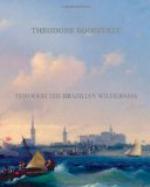Accordingly, I wrote to Frank Chapman, the curator of ornithology of the museum, and accepted his invitation to lunch at the museum one day early in June. At the lunch, in addition to various naturalists, to my astonishment I also found Father Zahm; and as soon as I saw him I told him I was now intending to make the South American trip. It appeared that he had made up his mind that he would take it himself, and had actually come on to see Mr. Chapman to find out if the latter could recommend a naturalist to go with him; and he at once said he would accompany me. Chapman was pleased when he found out that we intended to go up the Paraguay and across into the valley of the Amazon, because much of the ground over which we were to pass had not been covered by collectors. He saw Henry Fairfield Osborn, the president of the museum, who wrote me that the museum would be pleased to send under me a couple of naturalists, whom, with my approval, Chapman would choose.
The men whom Chapman recommended were Messrs. George K. Cherrie and Leo E. Miller. I gladly accepted both. The former was to attend chiefly to the ornithology and the latter to the mammalogy of the expedition; but each was to help out the other. No two better men for such a trip could have been found. Both were veterans of the tropical American forests. Miller was a young man, born in Indiana, an enthusiastic with good literary as well as scientific training. He was at the time in the Guiana forests, and joined us at Barbados. Cherrie was an older man, born in Iowa, but now a farmer in Vermont. He had a wife and six children. Mrs. Cherrie had accompanied him during two or three years of their early married life in his collecting trips along the Orinoco. Their second child was born when they were in camp a couple of hundred miles from any white man or woman. One night a few weeks later they were obliged to leave a camping-place, where they had intended to spend the night, because the baby was fretful, and its cries attracted a jaguar, which prowled nearer and nearer in the twilight until they thought it safest once more to put out into the open river and seek a new resting-place. Cherrie had spent about twenty-two years collecting in the American tropics. Like most of the field-naturalists I have met, he was an unusually efficient and fearless man; and willy-nilly he had been forced at times to vary his career by taking part in insurrections. Twice he had been behind the bars in consequence, on one occasion spending three months in a prison of a certain South American state, expecting each day to be taken out and shot. In another state he had, as an interlude to his ornithological pursuits, followed the career of a gun-runner, acting as such off and on for two and a half years. The particular revolutionary chief whose fortunes he was following finally came into power, and Cherrie immortalized his name by naming a new species of ant-thrush after him—a delightful touch, in its practical combination of those not normally kindred pursuits, ornithology and gun-running.




